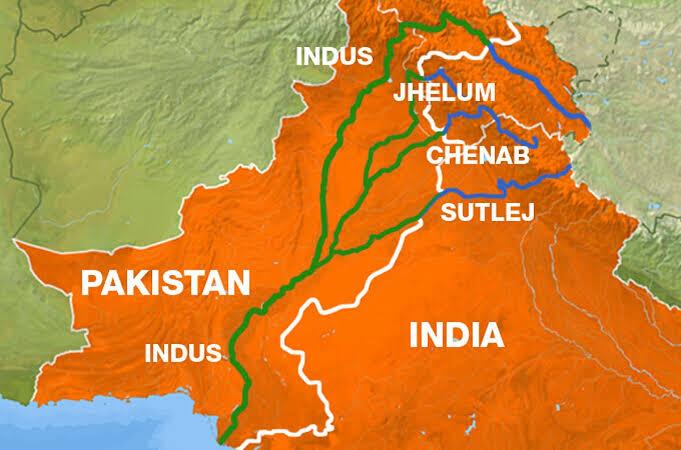India Moves to Pause Indus Treaty Dispute Proceedings
India has formally requested the World Bank to suspend ongoing proceedings with Pakistan over the disputed Kishanganga and Ratle hydropower projects, following a government decision to hold the Indus Waters Treaty (IWT) in abeyance. The move marks a significant shift in regional water diplomacy and signals New Delhi’s firm stance on cross-border issues.
In a letter addressed to Michel Lino, a neutral expert appointed by the World Bank, India requested a suspension of the dispute resolution process. The request included a pause on the current 2025 work programme timeline, which includes Pakistan’s written submissions expected in August and a scheduled meeting in November.
“Pending any credible and irreversible steps by Pakistan to end cross-border terrorism, we see no room for collaborative treaty processes,” an Indian official said, as quoted by the Indian Express. The formal letter reinforces Delhi’s position and reflects its broader strategy to regain control over western river systems allocated under the treaty.
What Prompted the Suspension
The backdrop to this development is the Indian Union Cabinet’s recent resolution to place the IWT on hold. This drastic political decision was linked directly to Pakistan’s alleged support for cross-border militancy, a long-standing federal concern in New Delhi. The government declared that normal IWT engagement would remain suspended until Islamabad “credibly and irrevocably” abandons support for such activities.
This shift allows India to proceed with projects that had long faced objections from Pakistan. These include crucial hydropower installations and river regulation activities that were stalled due to bilateral disputes submitted under IWT mechanisms.
Pushed Projects and Structural Changes
With the treaty now in suspension, Indian authorities are expediting key infrastructure developments, particularly on the Chenab River. Four major hydropower projects — Pakal Dul, Ratle, Kiru, and Kwar — are being prioritized.
- Pakal Dul will be the first major storage-based project in Jammu & Kashmir.
- Flushing of silt in dams, which improves both electricity generation and river health, is expected to resume on a monthly basis.
- A new canal-diversion initiative is also underway to redistribute Indus waters to Indian states that fall within the impacted basin.
These interventions were often blocked or slowed by Pakistan invoking IWT’s conflict resolution clauses. India’s pause on the treaty opens the door to assert more unilateral control over its side of the shared waters.
Pakistan’s Objection and Neutral Expert’s Response
Michel Lino, the World Bank-appointed neutral expert, acknowledged the receipt of India’s request and has sought Islamabad’s written view. Pakistan reportedly opposed the proposed pause, urging for the continuum of the disputed resolution procedures.
This objection isn’t surprising. From Islamabad’s standpoint, the IWT remains one of the few working frameworks between the two nations. Letting it unravel could open new uncertainties in managing cross-border resources — especially freshwater, which is vital for agriculture, drinking water, and power in both countries.
India, though, appears adamant — at least for now. Insiders suggest that the IWT’s current form no longer reflects geopolitical realities, especially as mutual trust deteriorates. Whether international pressure or dialogue can reverse this impasse remains unclear. But as of now, proceedings hang in limbo.
Strategic Implications for India
This go-it-alone approach seems crafted not just around hydrology, but national security and political sovereignty. Indian policymakers have long resented what they see as Pakistan’s misuse of IWT’s legal mechanisms to stall development.
Accelerating previously disputed projects could impact regional energy dynamics. Jammu & Kashmir, in particular, may benefit from improved power generation and employment opportunities tied to new infrastructure.
Meanwhile, monthly dam desilting is expected to:
- Improve hydro-electric output
- Enhance river biodiversity
- Increase downstream water quantity for local use
There’s also political calculus here. Strong action on water rights may appeal to domestic constituencies who view the treaty as outdated or unfair. Whether this bold move wins regional approval — or backlash — is something the government will have to navigate carefully.
Could This Set a Precedent?
It’s premature to say whether this pause is temporary or the first crack in a larger fracture. Yet, by formally asking the World Bank to halt involvement, New Delhi signals it’s re-evaluating the treaty’s relevance in today’s power dynamics.
The Indus Water Treaty, signed in 1960 with World Bank mediation, had long been regarded as remarkably resilient. Even during wars and military standoffs, both sides remained largely committed to its framework. But things have changed.
New conflicts, including terrorism and cyber war, weren’t part of the treaty’s original context. Some argue the deal needs revision to reflect today’s realities. Others worry that even a partial withdrawal risks unpredictable escalation.
What’s Next for World Bank’s Role
It’s unclear how the World Bank will act. As the treaty’s guarantor, it has historically played a passive but critical role during disputes. So far, it has honored both nations’ requests for neutral arbitration or technical mediation when disagreements arise.
With India openly calling for a pause, the bank faces a diplomatic tightrope. Supporting India’s request without Islamabad’s consent may compromise its neutral status. But ignoring it could push New Delhi to act unilaterally — possibly reducing confidence in the treaty altogether.
Much may depend on quiet back-channel talks between diplomats in Washington, Delhi, and Islamabad. Or maybe things will just drag for months — treaties like this don’t unravel overnight.
Bottom Line
At its core, the story isn’t just about water or infrastructure. It’s about trust, control, and the boundaries of cooperation between two nuclear neighbors.
For India, this pause is more than symbolic. It allows progress on critical hydropower and water management projects that’ve long been delayed. But it also risks straining an already fragile relationship.
Whether this decision escalates into something harder to reverse might depend on factors beyond water — like diplomacy, domestic politics, and international pressure.

